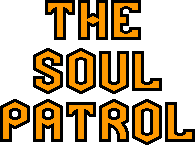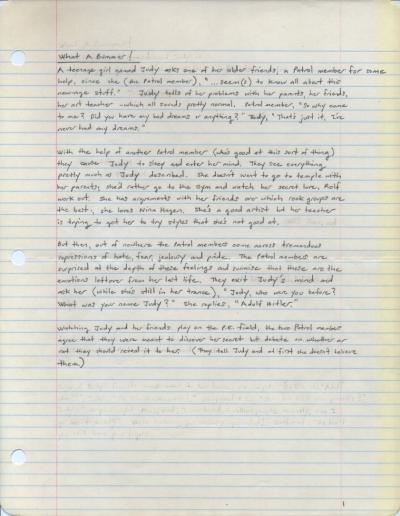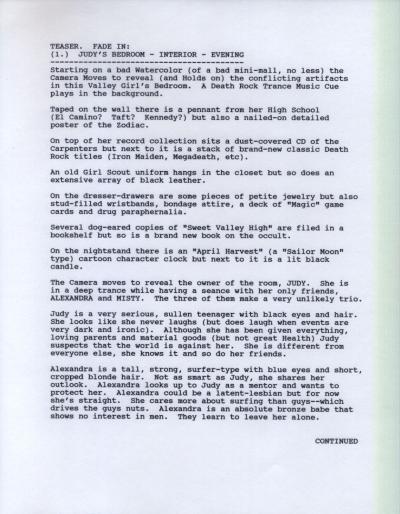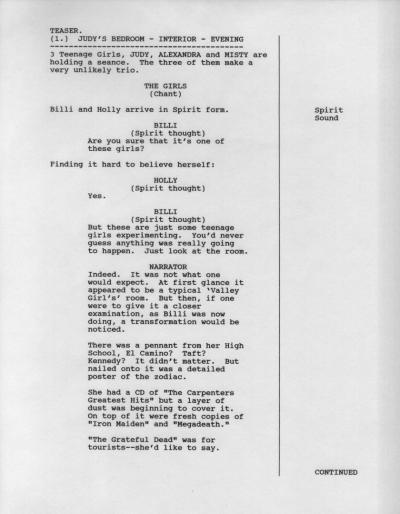
Writing The Series
Visit our main page for mpegs of the series.
The first 11 episodes of The Soul Patrol were originally written for television. Episodes 12 & 13 were written for radio and then adapted for television. Fans of the series have wanted to know about the process and how the content was changed. The biggest question (and misconception) seems to be, did the shows suffer when being adapted for radio? I don't think so. It seems that radio is always going to be more difficult for a TV generation to listen to! A number of visitors have also wanted an example of a good script format to write their own radioplays and the steps to getting there. With these questions in mind we present below a brief example of how a story was affected by being written first for television then adapted for radio in a script format that the cast & crew thought worked best. | |
(Click on the script page to see it [and additional pages] in a larger size.) After sketching out the plot a few times over a few weeks (figuring out the best way to plant dilemmas, realizations and then payoffs), I start writing the teleplay. Please note that you should never start writing a script without knowing how it's going to end AND at the same time, you must be prepared to change your preconceptions. One of the most enjoyable aspects of writing is making discoveries along the way and being open to going in a direction you hadn't expected. Technically speaking, the teleplay to this episode was different from most. The first page and a half was spent describing a room and the 3 main characters. Usually it's best to fly right into a story to get network executives on your side but this was a case where the set-up would add to the mystery and the tension--so I went with it. I enjoyed being able to reduce the plot to the standard 3 main characters: The protagonist, Judy, and the 2 opposing points-of-view espoused by her best friends, Alexandra (who would like Hitler) and Misty (who could end up being sent to death by a Hitler). And always follow the golden rule concerning teen stories: The fewer the adults, the better. Parents and other adults bring responsibility to the setting--reducing drama and comedy. Most of the adults in this story are neo-Nazis! On a later page there is a key scene with some of my favorite dialogue in the episode. It's comedic on the surface with irony running through it and my sarcastic viewpoint buried underneath. There's also another very unusual circumstance, where the final twist is clearly given away but almost no one ever notices it. (Did you?) It's when Judy clearly says that she never liked going to temple; therefore she's Jewish and so how can the neo-nazis reconcile that? It's scenes like these, that make writing and producing all worthwhile. | ||
(Click on the script page to see it [and additional pages] in a larger size.) When I wrote the teleplays I had no idea that one day I would be adapting them for radio. So, in another unique circumstance to this episode, I found that taking the descriptive part of the opening worked really well as narration. It really set the mood and I now like the opening of the radio version more than the TV version. (Plus it helped to have such a good narrator in Peter Beckman.) I have this rule for radio that you might agree with: That you can only use a narrator once for each half-hour. (Avid listeners have noticed the one time I broke that rule in episode 6.) Please notice the format for the radio version--which is not the way they did it in the golden age. Radio scripts back then had audio cues on the left (because they often came first) with dialogue on the right. Pages were evenly split. But we were not performing these shows live. For our purposes I reversed the order and gave a lot more space for the dialogue. This resulted in being able to fit a lot more sheets of the script on the stands for the actors to perform from. We could get longer takes this way and as director I could insert isolated imitations of sound effects to help cue the actors. | ||


